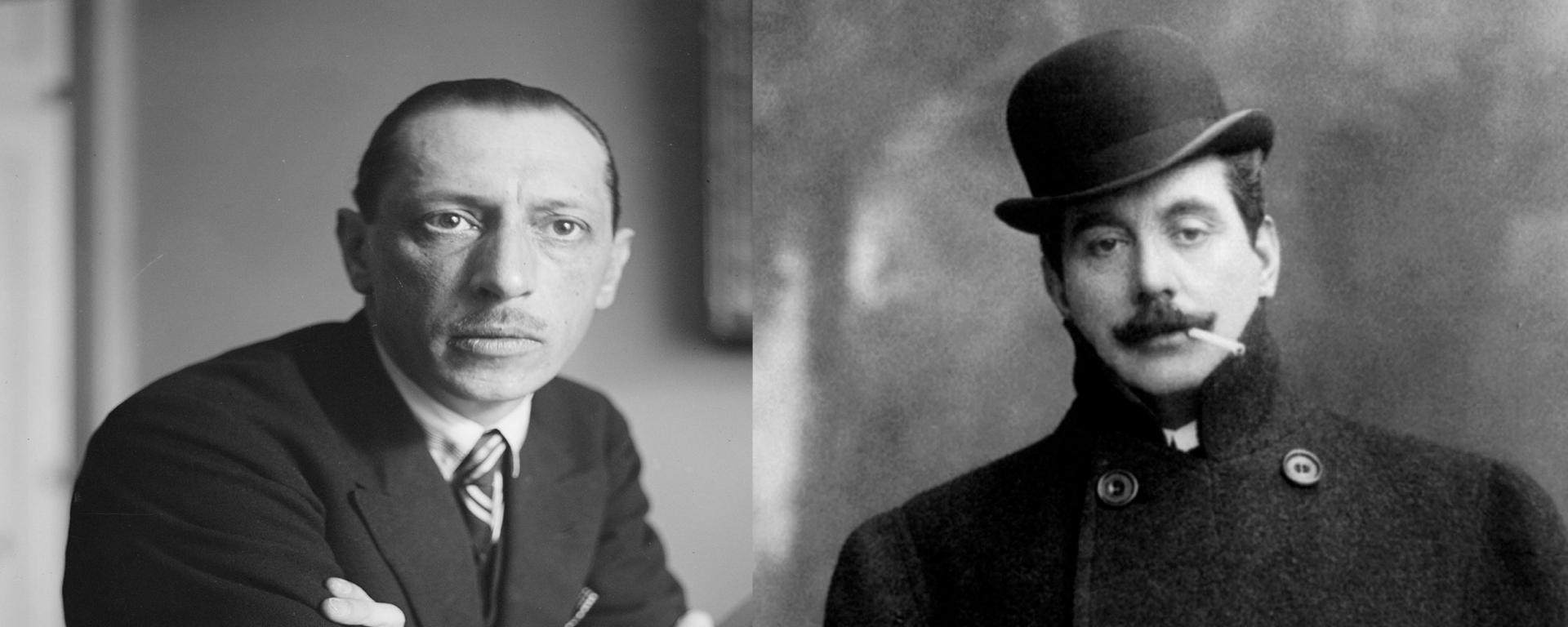Dittico - Mavra/Gianni Schicchi
Mo | Tu | We | Th | Fr | Sa | Su |
Mavra
The Mavra project, a comic opera in one act with a libretto by Boris Kochno, was born in 1921 while Stravinskij was in London for a revival of Le sacre du printemps. The subject is taken from a short story by Puškin called The Little House in Kolomna, a simple story with a surprise ending. The young Paraša, in love with the hussar Vasilij, devises a plan to spend more time with her lover. Given the need to find a new maid after the death of the old cook, Paraša disguises Vasilij as a woman and introduces him to his mother and her neighbor as the new cook named Mavra. But the unlikely camouflage is short-lived because the hussar in women's circles is surprised by mother and daughter in the act of shaving his beard. The revelation of Mavra's true identity causes her mother to faint and her neighbor to intervene promptly; the hussar has no choice but to escape out the window while Paraša screams in despair. Mavra debuted in Paris on 3 June 1922 without however enjoying the hoped-for success. Stravinskij, despite Djaghilev's requests, refused to change the ending considered by his friend to be too banal and immediate, defending his choices and the value of this small work which he particularly cared about. He dedicated the score to Puškin, Glinka and Čajkovskij, a gesture that sounded like a provocation for those, especially in Paris, who associated Russian music only with folklore. The work divided into closed numbers - arias, duets, quartets - refers to the model of Italian melodrama. Even the bel canto vocality is linked to tradition, however Mavra is also an extremely modern work in which varied sound materials coexist - jazz cues, Russian and gypsy motifs - and in which continuous contrasts are created between the traditional vocal line and orchestral writing, characterized by an often mechanical progression and the predominance of harsh timbral mixtures. Stravinskij deliberately chose a singular instrumental team, in which the wind instruments are in the majority compared to the strings, to recreate in some moments the sounds of a band rather than an orchestra.
New staging
Synopsis
Place: Russian village
Time: Circa 1840
Parasha is in love with her neighbour, Vassili, a young hussar, but they have difficulty in meeting. After they sing a duet, Vassili leaves, and then Parasha's mother enters. She is lamenting the difficulty of finding a new maid-servant after their prior maid-servant, Thecla, died. The mother orders her daughter to find a new maid-servant. Parasha comes up with a scheme to smuggle Vassili into her house disguised as Mavra, a female maid-servant. The ruse initially succeeds, and Parasha and Vassili are happy at being under the same roof. Parasha and her mother go out for a walk. At one moment, Vassili shaves. The ladies return, disconcerted to see their new maid-servant shaving. Vassili escapes out the window, her mother faints, the next door neighbour rushes in to try to help, and Parasha laments the loss of her young love.
Gianni Schicchi
The last of the three one-act plays that make up Puccini's “Trittico”, Gianni Schicchi narrates the farc antics of the protagonist of the title, a Florentine scoundrel cited by Dante in the Divina Commedia for having forged a will. The action takes place in Florence in 1299. The Donati family is in turmoil after the death of their relative Buoso who seems to have donated his considerable inheritance to a convent. To find a solution, Gianni Schicchi, known in the city for his cunning and sagacity, is consulted. As a true deus ex machina, the protagonist pretends to be a dying Buoso but in dictating his last wishes to the notary he registers his most precious assets to 'his devoted friend' Gianni Schicchi, arousing the wrath of his greedy relatives. However, the scam is dictated by a noble aim; in doing so Gianni ensures a nice dowry for his daughter Lauretta who will be able to marry Rinuccio Donati with all due respect to the haughty family. For Puccini Gianni Schicchi represented a very successful foray into the comedy genre. The lively story also served as a perfect counterpoint to the two tragic stories that preceded it (Il tabarro e Suor Angelica). The Trittico debuted at the Metropolitan in New York on 14 December 1918. The public's reception was lukewarm, with the exception of Gianni Schicchi who immediately enjoyed great success. The secret of the immediate acclaim lies in the amalgam of ingredients of the comic tradition expertly dosed by the Tuscan composer: characteristic and hilarious vocal ensembles, brilliant writing and a very tight rhythm that leads to an applause-worthy finale.
Maggio Musicale Fiorentino staging
Synopsis
The story takes place in Florence, 1299. As Buoso Donati lies dead in his curtained four-poster bed, his relatives gather round to mourn his passing, but are really more interested in learning the contents of his will. Among those present are his cousins Zita and Simone, his poor-relation brother-in-law Betto, and Zita's nephew Rinuccio. Betto mentions a rumour he has heard that Buoso has left everything to a monastery; this disturbs the others and precipitates a frantic search for the will. The document is found by Rinuccio, who is confident that his uncle has left him plenty of money. He withholds the will momentarily and asks Zita to allow him to marry Lauretta, daughter of Gianni Schicchi, a newcomer to Florence. Zita replies that if Buoso has left them rich, he can marry whom he pleases; she and the other relatives are anxious to begin reading the will. A happy Rinuccio sends little Gherardino to fetch Schicchi and Lauretta.
As they read, the relatives' worst fears are soon realised; Buoso has indeed bequeathed his fortune to the monastery. They break out in woe and indignation and turn to Simone, the oldest present and a former mayor of Fucecchio, but he can offer no help. Rinuccio suggests that only Gianni Schicchi can advise them what to do, but this is scorned by Zita and the rest, who sneer at Schicchi's humble origins and now say that marriage to the daughter of such a peasant is out of the question. Rinuccio defends Schicchi in an aria "Avete torto" ("You're mistaken"), after which Schicchi and Lauretta arrive. Schicchi quickly grasps the situation, and Rinuccio begs him for help, but Schicchi is rudely told by Zita to "be off" and take his daughter with him. Rinuccio and Lauretta listen in despair as Schicchi announces that he will have nothing to do with such people. Lauretta makes a final plea to him with "O mio babbino caro"("Oh, my dear papa"), and he agrees to look at the will. After twice scrutinizing it and concluding that nothing can be done, an idea occurs to him. He sends his daughter outside so that she will be innocent of what is to follow.
First, Schicchi establishes that no one other than those present knows that Buoso is dead. He then orders the body removed to another room. A knock announces the arrival of the doctor, Spinelloccio. Schicchi conceals himself behind the bed curtains, mimics Buoso's voice, and declares that he is feeling better; he asks the doctor to return that evening. Boasting that he has never lost a patient, Spinelloccio departs. Schicchi then unveils his plan in the aria "Si corre dal notaio" ("Run to the notary"); having established in the doctor's mind that Buoso is still alive, Schicchi will disguise himself as Buoso and dictate a new will. All are delighted with the scheme, and importune Schicchi with personal requests for Buoso's various possessions, the most treasured of which are "the mule, the house and the mills at Signa". A funeral bell rings, and everyone fears that the news of Buoso's death has emerged, but it turns out that the bell is tolling for the death of a neighbour's Moorish servant. The relatives agree to leave the disposition of the mule, the house and the mills to Schicchi, though each, in turn, offers him a bribe. The women help him to change into Buoso's clothes as they sing the lyrical trio "Spogliati, bambolino" ("Undress, little boy"). Before taking his place in the bed, Schicchi warns the company of the grave punishment for those found to have falsified a will: amputation of one hand, and then, exile from Florence.
The notary arrives, and Schicchi starts to dictate the new will, declaring any prior will null and void. To general satisfaction, he allocates the minor bequests, but when it comes to the mule, the house and the mills, he orders that these be left to "my devoted friend Gianni Schicchi". Incredulous, the family can do nothing while the lawyer is present, especially when Schicchi slyly reminds them of the penalties that discovery of the ruse will bring. Their outrage when the notary leaves is accompanied by a frenzy of looting as Schicchi chases them out of what is now his house.
Meanwhile, Lauretta and Rinuccio sing a love duet, "Lauretta mia", as there is no bar to their marriage since Schicchi can now provide a respectable dowry. Schicchi, returning, stands moved at the sight of the two lovers. He turns to the audience and asks them to agree that no better use could be found for Buoso's wealth: although the poet Dante has condemned him to hell for this trick, Schicchi asks the audience to forgive him in light of "extenuating circumstances."
Program and cast
ARTISTS
Conductor: Francesco Lanzillotta
Direction, sets, costumes and lights: Denis Krief
Maggio Musicale Fiorentino Orchestra
Mavra
Paraša: Julia Muzychenko
La madre: Kseniia Nikolaieva
La vicina: Aleksandra Meteleva
L'ussaro: Iván Ayón Rivas
Gianni Schicchi
Gianni Schicchi: Roberto De Candia
Lauretta: Julia Muzychenko
Zita: Kseniia Nikolaieva
Rinuccio: Iván Ayón Rivas
Nella: Nikoletta Hertsak
Simone: Adriano Gramigni
La Ciesca: Aleksandra Meteleva
Teatro del Maggio Florence State Opera Italy
Teatro del Maggio is in the centre, close to the old city walls, next to the historic Stazione Leopolda. The garden that welcomes visitors is Piazzale Vittorio Gui, named after the founder of the Stabile Orchestrale Fiorentina and the Maggio Musicale Fiorentino.
By train
Santa Maria Novella is Florence's main train station.
From there you can reach the theatre with a short walk (about 10-15 minutes) or by taking the tram (a stop) or a taxi.
By car
The Opera di Firenze is just outside the ZTL area.
It is possible to park near the Parco delle Cascine or for a fee in the Porta al Prato car park (Via Elio Gabbuggiani, 7) and in the Piazza Vittorio Veneto car park.
By bus
Lines C1, C2 and D (Leopolda stop);
Lines 17 and 23A-B (stop Via delle Carra);
Lines 17B-C, 22, 23N, 23 and 57 (Pierluigi da Palestrina stop);
Lines 29, 29B, 29BA, 29BC, 29D, 30A, 30B, 30AC, 35 and 35° (stop Leopolda - Porta al Prato; Capolinea).
By tram
Line T1 (stop Porta al Prato - Parco della musica).

 EN
EN DE
DE IT
IT FR
FR ES
ES RU
RU JP
JP RO
RO
 Seating plan
Seating plan 